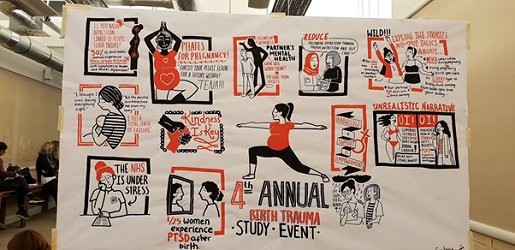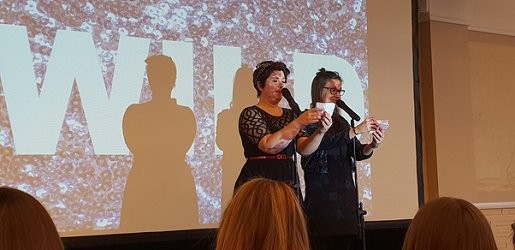To read or download this Journal in a magazine format on ISSUU, please click here
AIMS Journal, 2019, Vol 30, No 4
By Maddie McMahon

When I became a doula nearly 16 years ago, the term birth trauma was largely unknown. There were certainly no conferences dedicated to the subject. It is heartening that the intervening years have seen a growth in awareness of the psychological impact of birth, both on the birthing person and their partner and wider family.
Along with a greater understanding of birth trauma has come an explosion in services tailored to meet the needs of traumatised families and a much greater interest in exploring this important topic. Part of this consciousness raising is due to sterling work by a few individuals, one of whom, Dr Rebecca Moore, perinatal psychiatrist, is responsible for the annual birth trauma event, which this year was in Chinatown in London.
Rebecca is part of The Make Birth Better campaign (makebirthbetter.org), a multi-disciplinary group of interested campaigners, including AIMS, working to raise awareness and understanding of birth trauma amongst birth workers. You can read more about the campaign and AIMS involvement here.
This year’s conference was clearly designed to provide detailed information on birth trauma itself; its ripple effects and tools that can provide support and comfort to affected families. It was a packed menu, perhaps a little too packed, but I understand the temptation to include as many fine speakers as possible in this one-day event. The general theme seemed to focus on recovery from birth trauma, both physical and emotional, together with the potential knock-on effects of a traumatic birth.
We heard from Sakina Ballard, member of the Make Birth Better network and hypnobirthing teacher, who clearly explained the psychological causes of trauma and PTSD. Anya Hayes, pilates instructor, called for greater acknowledgement and treatment of pelvic floor damage and its impact on mental health. Susan Parker, 3rd year student midwife, shared her project around paternal postnatal depression, reminding us that 8% of fathers suffer from mental health challenges post-birth.
Alison Barker, nutritional therapist, introduced the term ‘postnatal depletion’: a term I found useful to sum up the potential impact of an unsupported birth and postpartum period and the impact good nutrition can have on a mother’s experience. Next, author and academic Diane Spier shared her postpartum wellness plan. This was followed by the talented women of WILD ABOUT BIRTH, a theatre piece that mixes narrative, comedy and audience participation to explore the notion that, perhaps we are telling the wrong stories about birth.
The day was completed by listening to the experiences of Deirdre Madden and Emma Sheridan, who recounted their experiences as traumatised mother and art therapist working together through Emma’s tough feelings around her birth. The final session of the day was presented by Shweta Panchal who shared her wisdom gained from using yoga movements and breath work with traumatised parents.
There was much wisdom and practical information included in the day, notably the reminder that trauma is a complex topic and whilst we can’t forget the attendant pain and suffering, trauma can also be an opportunity for growth and transformation, as the sharing of this Cynthia Occelli quote reminds us:
“For a seed to achieve its greatest expression, it must come completely undone. The shell cracks, its insides come out and everything changes. To someone who doesn’t understand growth, it would look like complete destruction”
Overall, I found the day useful and validating and I look forward to the Make Birth Better campaign further influencing maternity care in the UK. However, I admit to being a little disappointed at the lack of exploration of why birth trauma happens in the first place. Given the general acceptance that postpartum symptoms of trauma and PTSD are on the rise, it seems to me that any discussion of this topic should not fail to discuss the root causes, otherwise we risk falling into a fatalistic attitude of acceptance.
Even the talk of birth plans during the day centred around the need for women with previous trauma to plan for her next birth. I feel we need more discussion of preventative measures and an exploration of the evidence for birth care that may avoid trauma in the first place. I think it would be useful, therefore, to talk about NHS short staffing, lack of continuity of carer, the epidemic of induction and the case for improved social support from family, community and doulas.
In conclusion, thank goodness for the Make Birth Better network. It was heartening to see so many midwives at this event. I hope in years to come that more obstetricians will attend events such as this.

The AIMS Journal spearheads discussions about change and development in the maternity services..
AIMS Journal articles on the website go back to 1960, offering an important historical record of maternity issues over the past 60 years. Please check the date of the article because the situation that it discusses may have changed since it was published. We are also very aware that the language used in many articles may not be the language that AIMS would use today.
To contact the editors, please email: journal@aims.org.uk
We make the AIMS Journal freely available so that as many people as possible can benefit from the articles. If you found this article interesting please consider supporting us by becoming an AIMS member or making a donation. We are a small charity that accepts no commercial sponsorship, in order to preserve our reputation for providing impartial, evidence-based information.
AIMS supports all maternity service users to navigate the system as it exists, and campaigns for a system which truly meets the needs of all.